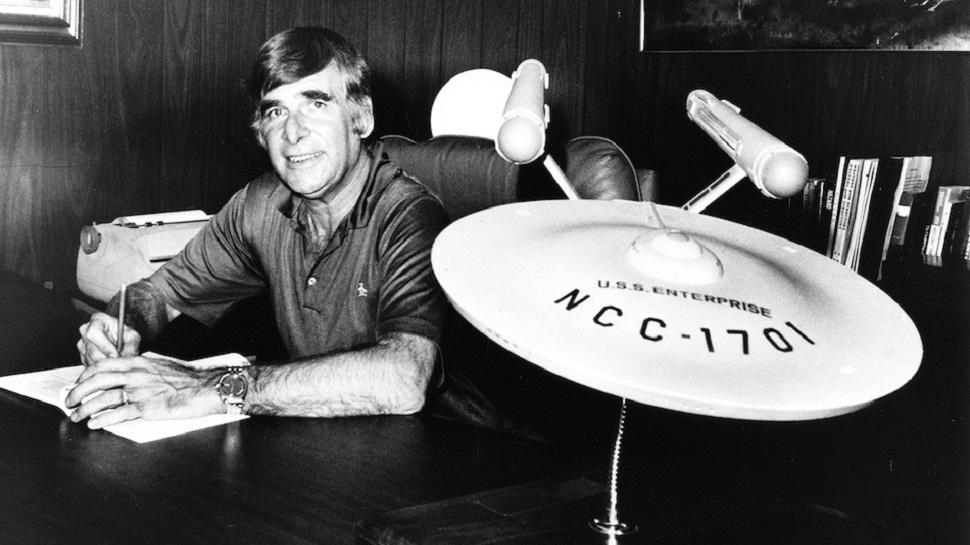On 8 September 2006, fans from around the world gathered at the Science Fiction Museum and Hall of Fame in Seattle to take part in Planet Xpo's Star Trek 40th Anniversary Gala Celebration and Conference.
Arthur C Clarke wrote a special essay to mark the occasion, which was published on the event’s blog. In it, he recalled how he once helped save Star Trek from oblivion by giving a moral boost to its creator just when the latter needed it.
Here is the full essay, whose copyright is owned by the Arthur C Clarke literary estate:
Forty years of Star Trek
By Arthur C Clarke
I still can’t believe that it’s now forty years since Star Trek entered our lives – and we started roaming the universe of Star Trek.
How things have changed! Star Trek was born at a time when the Space Age was less than a decade old, and humans had just taken a few faltering steps into near space. The United States and the late, unlamented USSR were locked in the Space Race, itself a product of the Cold War. The spectre of nuclear war loomed large, and the civil rights and women’s movements were still struggling for equality among humans.
Appearing at such a time in human history, Star Trek popularised much more than the vision of a space-faring civilisation. In episode after episode, it promoted the then unpopular ideals of tolerance for differing cultures and respect for life in all forms – without preaching, and always with a saving sense of humour.
Over the years, the sophistication of storylines and special effects has certainly improved, but Star Trek retains its core values – still very much needed in our sadly divided and quarrelling world.
There are purists who say that Star Trek isn't science fiction, but science fantasy -- and they have a point. Genuine science fiction should describe things that could happen according to present knowledge, and today we are fairly certain that we won't be able to dash from one star system to another in time for the next week's episode. We can also be sure that the inhabitants of other worlds won't look anything like human beings -- or speak fluent American.
But we have to remember that much that once seemed fantasy has now become fact. Seventy years ago, if anyone had written a story in which a whole city was destroyed by banging two small pieces of metal together, virtually all physicists would have said: "Utter nonsense!" Yet this is how the greatest of wars was ended in 1945.
Today there are many other examples of my Third Law: ‘Any sufficiently advanced technology is indistinguishable from magic’ (I’m amused to hear from a friend that the villain Lex Luthor utters these very words in the latest Superman movie, which I haven’t yet seen. My agents will be following this up.)
Although Gene Roddenberry and I met only a few times, we had a warm friendship that lasted twenty years. I am proud to have played a part in creating one of the great icons of our time – as Gene reminded my biographer, Neil McAleer, when he made an extremely generous assessment of my contribution.
Nor was this the first time; in 1987, he wrote for my seventieth birthday felicitation volume: “Arthur literally made my Star Trek idea possible, including the television series, the films, and the associations and learning it has made possible for me.”
He continued: “My association with the Clarke mind and concepts began in 1964 with his book Profiles of the Future. In 1969, I travelled to Arizona to listen to a Clarke lecture on astronomy, where….I was persuaded by him to continue my Star Trek projects despite the entertainment industry’s labelling the production as an unbelievable concept and a failure…It was a friendship that deepened into the most significant of my professional life.”
That was indeed how it happened. After attending my lecture, Gene introduced himself and told me that his series was being cancelled because the television executives, in their inscrutable wisdom, had decided that there was no audience for it. Poor Gene was broke and about to mortgage his home. I introduced him to my lecture agent, who was skeptical but booked him into a small hall -- which couldn't hold the audience he attracted.
The rest, as they say, was television history. I am very glad that Gene went on to achieve professional success and world respect. What must have given him even greater satisfaction is that he lived to see so many of his ideals triumphantly accepted.
As I wrote in my tribute to Gene upon his death: “Few men have left a finer legacy. The Enterprise will be cruising the galaxy for centuries to come.”




